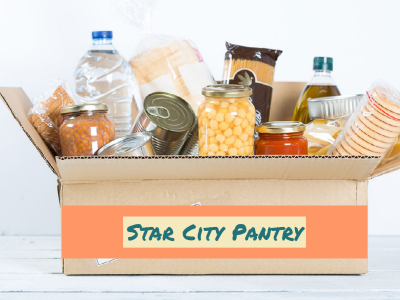Star City Pantry  Rev. Carole Beal McKenzie has retired from her position as Minister at the Star City United Church in Star City, Saskatchewan. However, she and her husband are still involved with the community of faith, including its program to put together and distribute food hampers for community residents in need each January.
In January 2021, there was so much food left over after making up the hampers that Star City United Church decided to make a more concentrated effort at tackling food poverty. But they didn’t want to create a traditional food bank, where people had to prove they were in need by providing financial information and take what was on offer (whether they wanted it or not.) In February, the community of faith set up the Star City Pantry once a week–a table of the food left over from the January hamper program, supplemented by produce that Carol purchased. Anyone was welcome to help themselves to what they needed.
This focus on collective care has generated significant community support: - The mayor lets the faith community collect food donations in the town office
- The community of faith buys produce, eggs, and dairy for the Pantry from a local provider
- Community residents regularly donate to the Pantry. A bakery from a nearby town sends free buns and bread every week. A farmer donates a substantial number of potatoes each week, and another farmer has donated money and meat from a steer he killed and sold. Money from $1000 donation made by a former resident living in another province helps to cover the cost of the produce that the three women who run the table buy each week (and other costs.)
The Star City Pantry, now three tables, also provides essential non-food items such as diapers, sanitary napkins, and garbage bags.
It also provides social support. When the Pantry first opened, no one showed up for a month. But word started to spread, and people slowly began to check out what was going on. Now the Pantry can expect seven to eight visitors when open, and as many as thirteen–a substantial number for a town with a population of fewer than 500 people. When it was too cold for people to wait outside for their turn to select food, they sat on chairs inside (masked and socially distanced, because of the pandemic) and a little community began to grow.
“People are very relaxed,” Carole tells Zoe.
For Carole, the most unexpected thing about starting the Star City Pantry is that it was started at all. She had never seen a community of faith attempt anything like it, observing that they tended to instead give money to other organizations addressing food poverty without taking action themselves, or just gave small amounts of food out of their offices. In contrast the Pantry gets money from the Star City United Church’s budget and received an Embracing the Spirit Innovation Grant.
The difference that the Star City Pantry makes may seem small, but it’s huge to the people who access it. The ripple effect of the Pantry is that if it saves people even $40 a month in groceries, that’s $40 that can help them meet another one of their needs a little more effectively.
The Pantry is expensive to run, and Carole doesn’t know how long the money can carry it. But she hopes that it can stay open. She has seen the need for it, especially as costs rise.
“The whole thing is a faith journey,” she says.
Watch Zoë Chaytors' full EDGEy conversation with Carole Beale McKenzie. [Image credit: Lkowalyk/AdobeExpress] | 




No comments:
Post a Comment